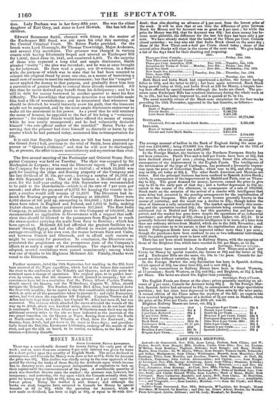Edward Beaumont Smith, charged with felony in the matter of
the Exchequer Bill fraud, was put upon his trial this morning, at the Central Criminal Court. Mr. Baron Parke presided. On the bench were Lord Monteagle, Sir Thomas Trowbridge, Major Anderson, and several City merchants. The prisoner was charged in various counts with having feloniously forged and uttered an Exchequer Bill for 1,0001., dated June 16, 1841, and numbered 6,405. To the surprise of those who expected a long trial and ample disclosures, Smith pleaded "Guilty "; the plea was recorded ; and he was at once brought up for judgment. He then read a paper, not ill-written, in a fluent style, the purpose of which was to state that he had been tempted to commit the original fraud by some one else, as a means of borrowing a small sum of money to meet his embarrassments ; bat that his " tempter " never applied the money to that purpose, and gradually drew him into a succession of greater frauds to conceal those already committed. All this time he never derived any benefit from his delinquency ; and he is still in debt for money borrowed in another quarter to meet his first difficulty. The knowledge that ultimate detection was inevitable made him lead a life of wretchedness; and he determined that whenever he should be detected, he would instantly avow his guilt, that the innocent might not be suspected, and by the most ample disclosures endeavour to make all the atonement in his power. As a proof that he still retained the sense of honour, he appealed to the fact of his being a "voluntary prisoner" ; for similar frauds would have offered the means of escape while he was totally unsuspected ; and he had voluntarily declared himself "the sole official author of the mischief." Baron Parke ob- serving that the prisoner had done himself no discredit or harm by the course which he had pursued today, sentenced him to transportation for life.
It is said that Rapallo (against whom no bill has been presented to the Grand Jury) had, previous to the trial of Smith, been admitted ap- prover or "Queen's evidence," and that he will now be discharged. So, at present, the affair is more unsatisfactory and mysterious than ever.


























 Previous page
Previous page